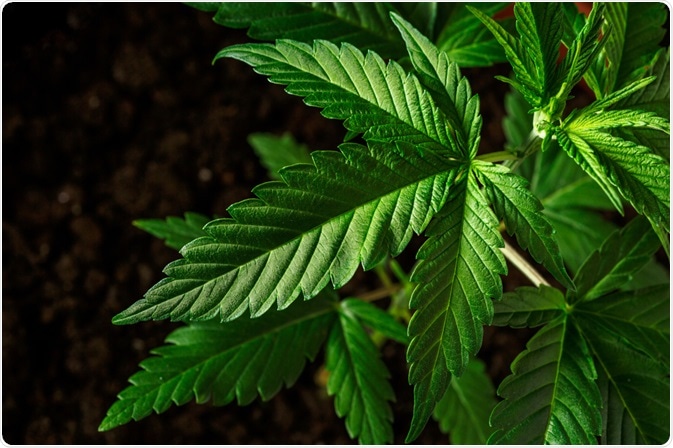Antibiotics are becoming less effective as bacteria are becoming increasingly resistant. If nothing is done to address this, the world will be heading to an era where common infections will revert to being life-threatening as they were in the years before antibiotics were developed.

Cannabis. Image Credit: Bukhta Yurii/Shutterstock.com
New research has demonstrated the potential use of cannabinoids, the non-psychoactive component of cannabis, in solving this problem. Recently, scientists have found that combining cannabidiol (CBD) with antibiotics can elevate the antibiotic effect.
There is evidence that this innovative therapeutic is effective at killing the bacteria that underlie common infectious diseases such as gonorrhea, meningitis, and legionnaires disease. Scientists hope that this research could lead to the establishment of the first new class of antibiotics designed to target resistant bacteria in 60 years.
The threat of antibiotic resistance
According to the World Health Organization (WHO), the issue of increasing antibiotic resistance poses one of the largest global threats to health, development, and food security. As a result of increasing resistance, infections that at one point were easy to resolve with antibiotics, such as gonorrhea, pneumonia, salmonellosis, and tuberculosis, are once again becoming challenging to treat as antibiotics lose their efficacy against the bacteria that are responsible for these illnesses. This is leading to the cost and resources associated with treating these infections rising alongside the associated mortality rates.
In certain parts of the world, the impact of increasing antibiotic resistance is reaching dangerously high levels. Each year, new mechanisms of resistance develop and spread throughout the world, which is seriously undermining our ability to treat common infections. Once more, common infections and injuries will have the power to kill.
To prevent this devastating result, scientists have been investigating non-antibiotic compounds that can increase antibiotic efficacy, known as helper compounds. One of these helper compounds that has gained attention recently is CBD, the main non-psychoactive component of cannabis. Here, we discuss research that explores the role of CBD in developing a new class of antibiotics aimed at treating antibiotic-resistant bacteria.
CBD enhances the efficacy of antibiotics against Staphylococcus aureus bacteria
In 2020, researchers working at the University of Southern Denmark published findings in the journal Scientific Reports that outlined how CBD had successfully enhanced the antibiotic bacitracin effect on a human pathogen related to community- and hospital-acquired disease, the Staphylococcus aureus bacteria.
Over time, multidrug-resistant clones of Staphylococcus aureus bacteria have spread across the world, with some regions hit particularly hard, and, as a result, are finding it increasingly difficult to bacterial infections with these resistant bacteria.
According to the paper’s findings, combining CBD with antibiotics may be an effective approach to fighting infections with antibiotic-resistant bacteria. Their data revealed that treating the bacteria with the CBD combined antibiotic prevents them from dividing as they usually would.
In addition, the bacteria exposed to the novel antibiotic expressed lower levels of key genes involved in cell division and autolysis. Finally, the team also found that the membrane of the bacteria became unstable following treatment.
The researchers concluded that their evidence highlighted the potential of combining antibiotics with a helper compound to increase antibiotic efficacy. They hypothesized that the resultant novel antibiotic would be required in smaller doses to have the same effect, and, therefore, potentially prevent the development of further antibiotic-resistant bacteria.
Scope of antibiotic potential for CBD
This year, a team of researchers at the University of Queensland, Australia, provided further evidence of the potential for CBD to enhance antibiotics and address antibiotic resistance. Sexually transmitted infection gonorrhea is no longer treatable with a single antibiotic due to the resistance developed in the bacteria that cause the infection.
The team in Australia demonstrated that CBD can enhance antibiotics used to treat gonorrhea by penetrating and killing the pathogen. This is the first instance of CBD being used to kill Gram-negative bacteria, which have an extra outer membrane, making them harder to penetrate and kill. Additionally, the data showed the ability of CBD to kill other types of Gram-positive bacteria, such as MRSA.
The scientists involved in the project explain that CBD’s efficacy lies in its ability to break down biofilms which enable bacteria to survive antibiotic treatments. It is hypothesized that CBD breaks the cell membranes, killing the bacteria. However, the exact mechanism whereby it achieves this is not yet known and requires further research.
Further to this, the team also found that chemical analogs produced by amending the structure of CBD were also effective against the bacteria. This is exciting as it demonstrates the potential to create an entirely new class of antibiotics to treat a range of Gram-negative infections, for which no new antibiotics have been developed since the 1960s.
Creating a new class of antibiotics
The research demonstrates the huge potential for developing effective antibiotics treatments that will help to prevent the growing problem of antibiotic resistance. The fact that chemical analogs have also been shown to be effective demonstrates the potential to create analogs of CBD with further improved properties.
The next steps will be to gain more information on the mode of action of CBD against Gram-negative bacteria to enhance its activity and work towards establishing a new class of antibiotics.
Sources:
- Antibiotic resistance. World Health Organization. Available at: https://www.who.int/news-room/fact-sheets/detail/antibiotic-resistance
- Blaskovich, M., Kavanagh, A., Elliott, A., Zhang, B., Ramu, S., Amado, M., Lowe, G., Hinton, A., Pham, D., Zuegg, J., Beare, N., Quach, D., Sharp, M., Pogliano, J., Rogers, A., Lyras, D., Tan, L., West, N., Crawford, D., Peterson, M., Callahan, M. and Thurn, M., 2021. The antimicrobial potential of cannabidiol. Communications Biology, 4(1). https://www.nature.com/articles/s42003-020-01530-y
- Wassmann, C., Højrup, P. and Klitgaard, J., 2020. Cannabidiol is an effective helper compound in combination with bacitracin to kill Gram-positive bacteria. Scientific Reports, 10(1). https://www.nature.com/articles/s41598-020-60952-0
Further Reading
Last Updated: Mar 23, 2021